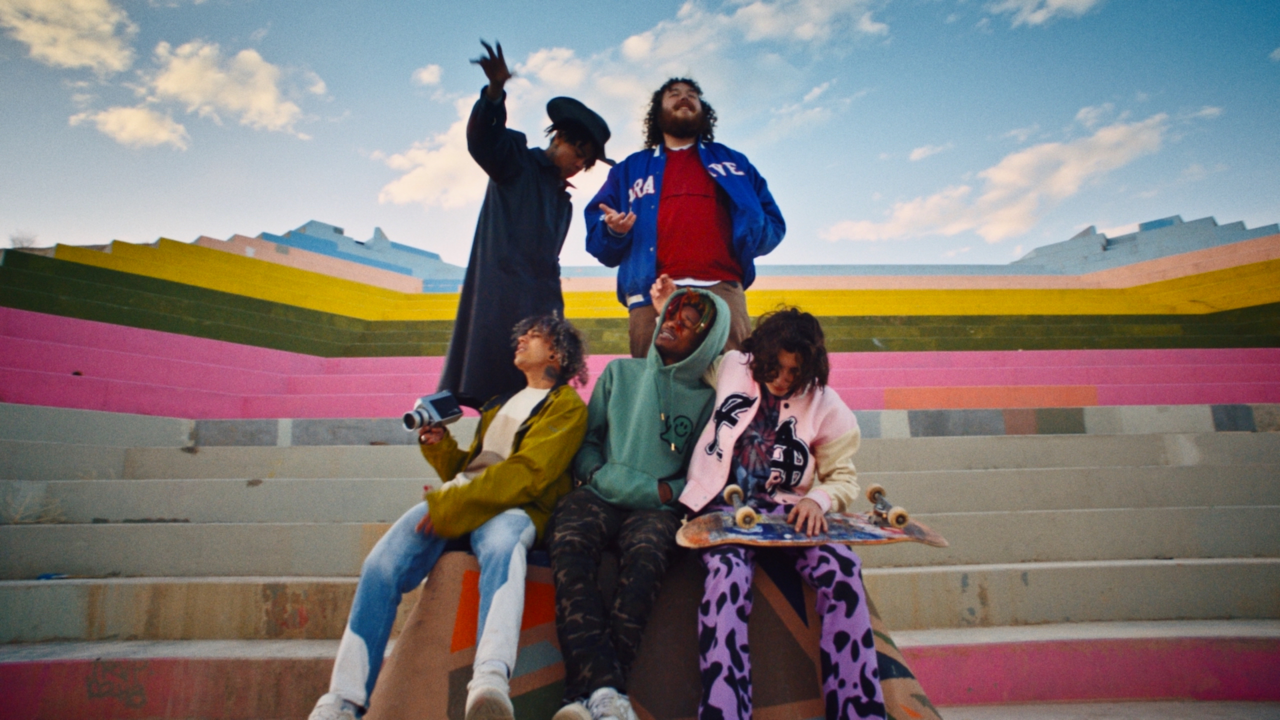One of the reasons why Lost Soulz (2023) interested me is also, ironically, one of the key differentiators of this movie when stacked against other movies featuring rappers of a diverse cast. Unlike other rapping groups storifying the hardships of life or the other extreme, the fetishization of wealth, this film is scored to a lo-fi soundtrack with raps featuring moody verses of the youth of the present generation, burdened with sensitivity.
As the movie opens, Sol (Suave Sidle) is an aspiring rapper from Austin who is busy with his manager Wesley working on a mixtape, which they hope to finish recording and go to LA to work their way out. For Sol, that chance comes when he performs at a house party and gets noticed by the headline group of five rappers on their way to LA. They manage to rescue Sol from a bind and ask him to accompany them.
Sol agrees, partly because Wesley had passed out from drugs but also to serve Sol’s own ambition. The movie then becomes a road trip and a visual album of a fictional rap group, where it follows their van winding through the roads of West Texas, conversing and talking with the locals, singing and freestyling in the van, and smoking up.
The movie reminding you of a visual album isn’t an off-base observation because almost two-thirds of the film has scenes connected or scored to songs sung by the actors, who are mostly Instagram hip-hop artists in real life and who had been chosen by the director Propper precisely because of that. However, this works in setting up the vibe of the film, and soon the film becomes a free-flowing odyssey, and without the presence of many extraneous conflicts, we are witness to events where talented young minds come together and bond over their love of making music.

It’s a collaborative effort made all the more memorable because the music itself is remarkably serene and beautiful. The perfection of collaboration is crystallized in one scene where the group converges in a studio. As the engineer plays a beat, we see the group conjure, collaborate, and produce a song in real-time by freestyling. It is one of those moments where the movie could have chosen to end.
Alas, the movie’s predilection to actually have a plot is what stops it from having a free flow throughout. Ironically, that might have been to lengthen the run-time of the movie, but plotting a movie like “Lost Soulz” at its easiest would entail utilising the tropes of the music biographical movies, especially the conflicts, which usually appear like clockwork.
The division between Sol and Seven, one of the group members who is emotionally withdrawn and addicted to drugs, or Sol’s guilt over leaving Wesley and his sister behind, weighs heavily on the narrative. The problem isn’t these plot threads not working in a vacuum. The problem is that the payoff of the plot occurs only in the final thirty minutes, with the movie being completely backloaded by story elements, which adversely affects the non-narrative structure of the movie, a la Terrance Malick.
The seriousness of the plot threads creates a jarring impact on the overall tone of the film itself, due to which the movie ultimately becomes a melancholic yet predictable one, focused on whether Sol can finally figure out his life. And while the actors are good enough, they aren’t capable enough to pull off the dramatic chops necessary during these serious moments. Conversely, the heartfelt moments at the van and the camaraderie of the group feel more natural, even though from a story perspective they should feel rushed.
For the majority of its runtime, “Lost Soulz” is an easygoing visual ASMR. The lack of an overarching narrative, coupled with the lo-fi soundtrack and the fact that the story follows a group of young people on a cross-country trip, makes for a relaxing watch, with moments of poignancy and light-hearted observations cleverly conceived by the director.
If the plot elements had been spread out throughout the narrative, fed through sprinkles and foreshadowing, the movie might have worked better as a plot-driven narrative. Still, it might have lost the sense of lyricism and poetic resonance hearkening to Terrence Malick – which is a clear inspiration – if the gorgeous cinematography and the sometimes poetic musings of the characters are any indications.





![Mallesham [2019] Review: A Heartwarming and Inspiring Biopic](http://www.highonfilms.com/wp-content/uploads/2019/05/Mallesham-Priyadarshi-2019-768x291.jpg)



![Doubt [2008]: A Crisis of Faith Leads to a Dissection of the Nature of Certainty](http://www.highonfilms.com/wp-content/uploads/2022/03/Doubt-Essay-768x432.jpg)